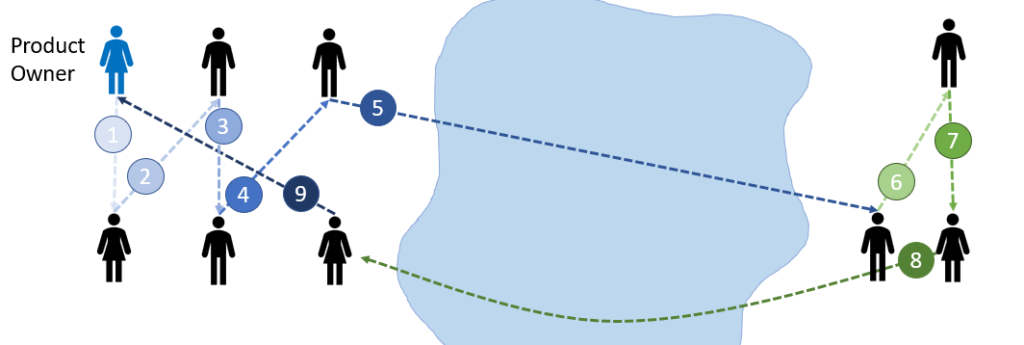V10 – Offshore Resources
In the Ball Game simulation, proximity is key to success. The ability to catch someone’s eye before you execute a small, controlled toss. Greater distance can result in longer throws, and more opportunities for mayhem to occur. You can simulate distributed team members by placing them farther away form the core group. This simulates the additional time and energy needed to maintain lines of communication, as well as simulating the increased likelihood of errors.
Origin: I was running the ball game for a very large group in a really big room (high ceilings, and a wide enough room that we needed two projectors so everyone could see the slides of the training class. As we talked about how important co-location could be to high-functioning teams, one of the PMs in the room declared quite forcefully that they were required to use offshore team members and that wasn’t going to change. I responded with, “I’m not saying you can’t do this with offshoring. I’m saying that if you do, you need to understand the impact of having team members operating in radically different time zones and locations.” To which they retorted: “I’ve never seen any negative impact to using offshore resources. Our throughput is just as high.”
The Simulation progressed, and we were on the third round. This person’s team was pretty big, maybe fifteen people. Right as they finished their estimates for the next round, I paused the group and addressed the PM. “Is this the team that uses the offshore resources?” “Yes.” “Okay, well it has been wonderful having you visit us to get spun up on the project, but it’s time for you to return home to work from there. I need the three of you to follow me….” and I led them all the way across the room. “Here. This is India.” I walked back across the room. “This is the ocean. You can’t step into the ocean.” I pointed at both groups. “You are all still members of the same team. You all still have to touch all the balls. You still have to toss the balls. Ready? Begin.”
The PM stepped up … “No, No, No! We need time to re-estimate for the sprint.” “Why?” I asked. “I have it on good authority there is absolutely no impact to productivity by using offshore resources, so no re-estimation should be necessary. Now, please begin.”
As the simulation commenced, velocity dropped slightly, due to the increased distance for at least two of the throws. Depending on the solution the teams have chosen, they may even feel compelled to throw each ball back and fourth several times. Aim is essential. Remember, if a ball touches the ground (or the ocean), it’s dead.

Reality Check: I want to be very clear. I’m not against offshoring. I’m against cross-shoring. I don’t like when we force people from radically different time zones onto a single team and expect them to collaborate effectively. In my experience, they don’t learn to work together. They learn to work apart. It’s not good for communication, collaboration or cross-training. In order to make cross-shoring work, someone has to be inconvenienced – whether it’s someone who stays up too late at night, gets up too early in the morning, or works longer hours just to maintain overlap between multiple time-zones. It’s exhausting. And tired people make mistakes. If you want to use offshore resources, go right ahead. But instead of one team that spans time-zones, try forming complete teams in each location so the members of each team can work together, and benefit from being together. BTW, this is where having the different sized balls as from V7 really hurt in the simulation. Those lighter balls don’t fly as far or as fast – mirroring both the increased energy needed to keep the lines of communication open, and perhaps even illustrating that some work is better worked on by co-located teams.
